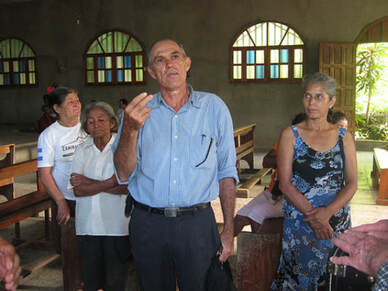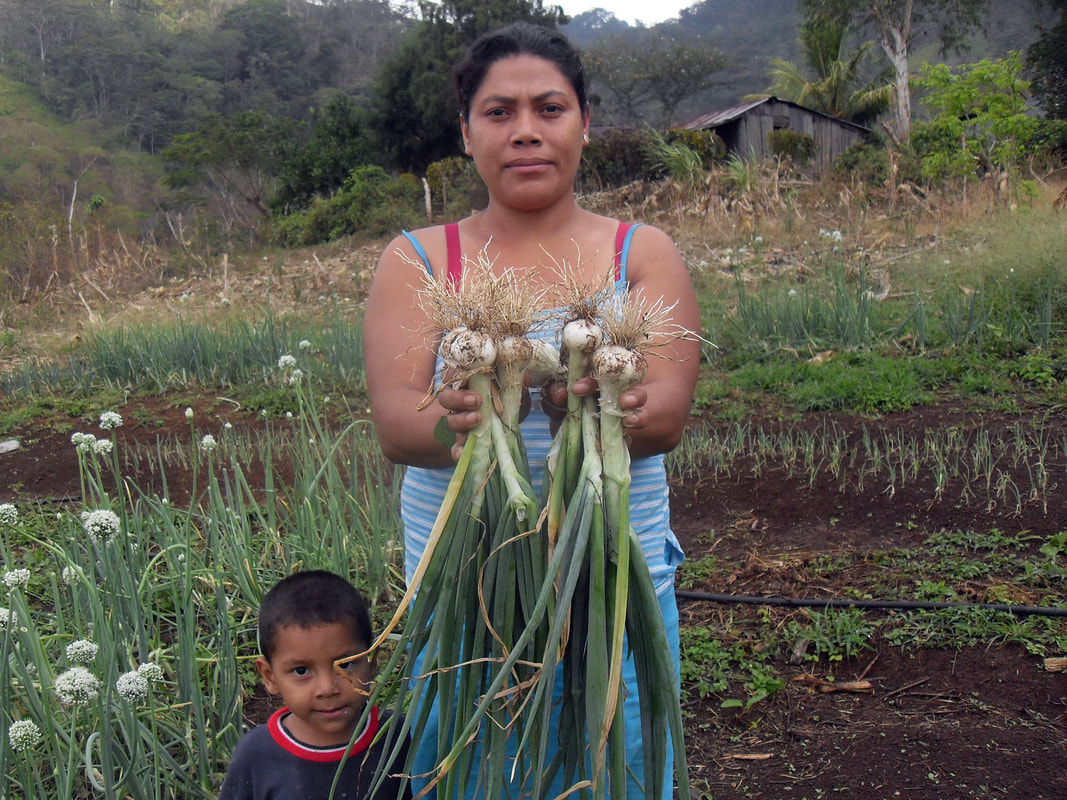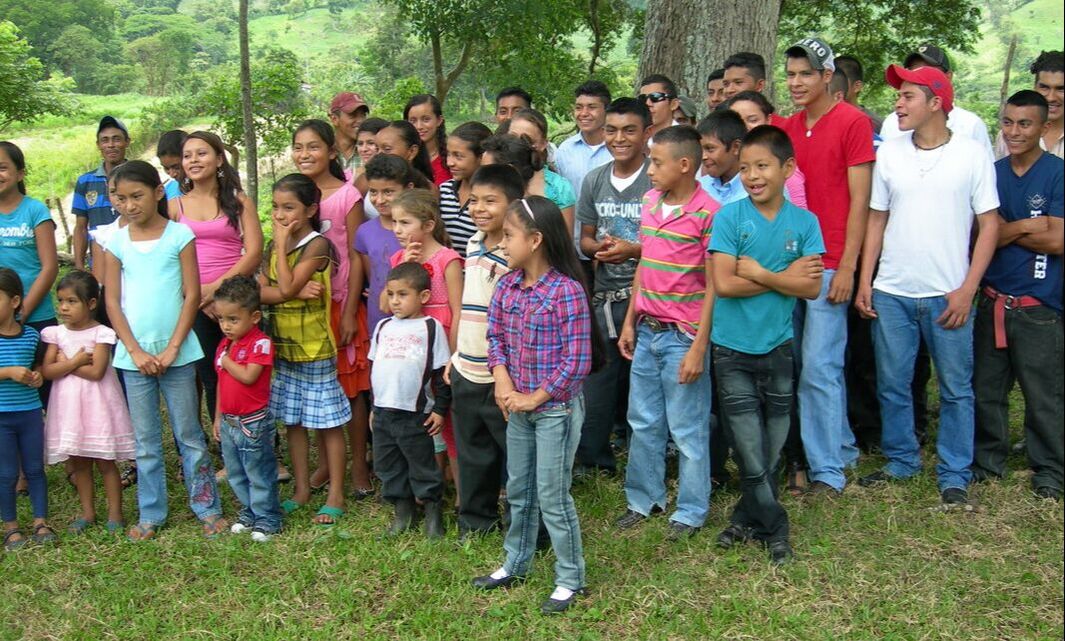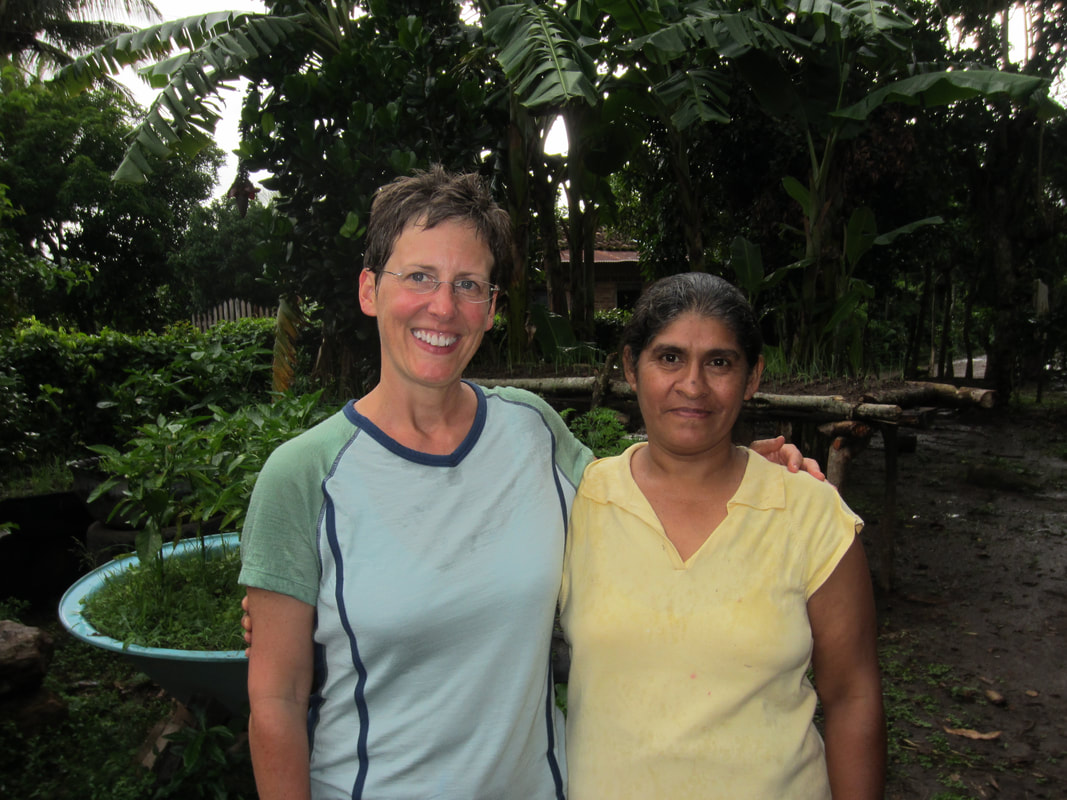By Maria Price, Friends of Esquipulas Board
| by Maria Price, Board Member of the Friends of Esquipulas | Orfa Jarquin Delgadillo, from the community of La Reforma, explained, “The present world is very different. Birds have been injured and are in danger of extinction, hunting of the wild animals also has increased for business and for food, and a moderate climate has changed into one of brusque, extreme events.” |
To our family members in Nicaragua, climate change is not about the future. The effects are being felt right now. To learn more about the realities of climate change, and understand how Friends of Esquipulas can stand in solidarity with our Nicaraguan family, seven farmers shared their current observations, their fears and hopes for the future, and their ideas about how to best combat the effects of a changing climate.
The farmers pointed to indicators of climate change, such as extreme weather incidents and the loss of wildlife. They identified deforestation as a current practice that has immediately damaging effects, especially related to the availability of water sources. When asked if the individuals noticed differences in the natural world within their own lifetimes, all agreed that changes are apparent.
IN THE PERIOD OF MY FATHER THERE WERE FERTILE LANDS….
The farmers pointed to indicators of climate change, such as extreme weather incidents and the loss of wildlife. They identified deforestation as a current practice that has immediately damaging effects, especially related to the availability of water sources. When asked if the individuals noticed differences in the natural world within their own lifetimes, all agreed that changes are apparent.
IN THE PERIOD OF MY FATHER THERE WERE FERTILE LANDS….

Senor Juan Gea Lopez of Terrero summarized his observations by saying, “The past is not comparable to today. Before there were many species of wild animals; today these cannot be seen. Some have gone extinct and others migrated to other areas in order to survive, due to climate change which has gradually been happening, such as longer droughts, great heat waves, and the rainy season much warmer.”
From Cinta Verde, Senor Agusto Godinez Garcia shared his concern for the future, saying, “During the time of our lives we have observed that many rivers, creeks and streams and springs have dried up. Because of this we are very concerned that in a day not too far from now in a future generation, the flora and fauna will be disappearing on the terrestrial globe.”
Diego Agustin de Rama said, “In the period of my father, there were fertile lands, the vegetable gardens and bean patches gave good harvests because the soils were good. Without having to add fertilizer we got good harvests, lots of seeds, and now because the forests have been cut down in one swoop, well, what happens from that now? If we don’t get fertilizer, there is no harvest.”
From Cinta Verde, Senor Agusto Godinez Garcia shared his concern for the future, saying, “During the time of our lives we have observed that many rivers, creeks and streams and springs have dried up. Because of this we are very concerned that in a day not too far from now in a future generation, the flora and fauna will be disappearing on the terrestrial globe.”
Diego Agustin de Rama said, “In the period of my father, there were fertile lands, the vegetable gardens and bean patches gave good harvests because the soils were good. Without having to add fertilizer we got good harvests, lots of seeds, and now because the forests have been cut down in one swoop, well, what happens from that now? If we don’t get fertilizer, there is no harvest.”
Climatologists are noticing as well. Just since 2017, Central America has been hit by Hurricanes Harvey, Irma, Maria, Nate, Eta and Iota. As reported by the North American Congress of Latin America, storms such as these, “are becoming more frequent in Nicaragua, and rainfall is becoming more intense, while overall precipitation is declining. According to the 2017 Germanwatch Climate Risk Index, between 1996 and 2015, Nicaragua was the world’s fourth-most-affected country by extreme weather.”
“Climate change may at least partly account for that trend,” according to an article published in Time magazine titled Hurricane Season 2021. Reflecting widely accepted science, the article continued with a grave warning, “Over the past hundred years, the surface temperatures in the North Atlantic Ocean have risen, a phenomenon linked to climate change and humanity’s emissions of greenhouse gases. Warmer waters tend to form storms with higher wind speeds and more rainfall, a trend that is likely to become more pronounced as the climate continues to grow warmer in coming years.”
The Union of Concerned Scientists summarizes the effects of climate change in much the same way as our farmer friends in Nicaragua. It describes that, “Higher temperatures are linked to almost all of climate change’s most severe impacts, including more frequent and intense heat waves, widespread crop failures, and dramatic shifts in animal and plant ranges. The world’s most vulnerable people – those with fewest resources and options – will suffer the most.”
Leaders of both Guatemala and Honduras have called upon the UN to declare Central America the region most affected by climate change.
In eloquent summary, Esquipulas community leader Juan Gea shared his painful worry for the future if the trends continue, saying, “The greatest worry for the future regards the rains that diminish, the disappearing forests, the heat that is increased because of cutting of the woods due to personal irresponsibility, by people who have no consciousness about Mother Earth.”
“Climate change may at least partly account for that trend,” according to an article published in Time magazine titled Hurricane Season 2021. Reflecting widely accepted science, the article continued with a grave warning, “Over the past hundred years, the surface temperatures in the North Atlantic Ocean have risen, a phenomenon linked to climate change and humanity’s emissions of greenhouse gases. Warmer waters tend to form storms with higher wind speeds and more rainfall, a trend that is likely to become more pronounced as the climate continues to grow warmer in coming years.”
The Union of Concerned Scientists summarizes the effects of climate change in much the same way as our farmer friends in Nicaragua. It describes that, “Higher temperatures are linked to almost all of climate change’s most severe impacts, including more frequent and intense heat waves, widespread crop failures, and dramatic shifts in animal and plant ranges. The world’s most vulnerable people – those with fewest resources and options – will suffer the most.”
Leaders of both Guatemala and Honduras have called upon the UN to declare Central America the region most affected by climate change.
In eloquent summary, Esquipulas community leader Juan Gea shared his painful worry for the future if the trends continue, saying, “The greatest worry for the future regards the rains that diminish, the disappearing forests, the heat that is increased because of cutting of the woods due to personal irresponsibility, by people who have no consciousness about Mother Earth.”
Farmer Agusto Godinez Garcia of Cinta Verde explained, “There are differences now that certain birds and animal species that used to exist are no longer encountered because they have migrated in search of habitat, and others have disappeared from their home places of reproduction, due to the deforestation that has occurred which has caused the water sources to recede more deeply, the overheating of the soils, which implies late growth of wildlife due to lack of water. These climate changes affect us because the sun’s rays penetrate directly upon us and are too hot and affect our crops. The air is hot which provokes diseases of people and animal and vegetable life.” |
WE NEED TO INVOLVE EVERYONE IN COMBATTING THIS SITUATION
Participants of the Organic Farming Project identified practices they currently incorporate into their work to mitigate the damaging effects of climate change. They report modifying the time that they plant in order to acclimate to heat, and installing irrigation systems. The farmers also identified several new action steps which involve regional or national initiatives complementing their local efforts,
Participants of the Organic Farming Project identified practices they currently incorporate into their work to mitigate the damaging effects of climate change. They report modifying the time that they plant in order to acclimate to heat, and installing irrigation systems. The farmers also identified several new action steps which involve regional or national initiatives complementing their local efforts,
- Workshops and training about farming in the face of climate change for project participants, including Field Schools for the exchange of experiences. Topics of interest include successful irrigation projects from around the world, use of organic fertilizer, and how to prevent disease on plants due to increased humidity.
- Launch a public education campaign using television, radio programs, pamphlets to raise consciousness in the population about the damage caused by deforestation and water pollution.
- Organize and support reforestation initiatives by planting saplings to restore healthy water systems and a diverse ecosystem.
Our Nicaraguan family is keenly aware of climate change and its effect on their lives and livelihood. Friends of Esquipulas is keenly aware that we are in this together. As Senor Juan Velazquez Hernande says, “We need to involve everyone in combatting this situation.”
University of California Berkley student Bernis Cunningham studied environmental issues in Nicaragua as a fellow in its Environmental Leadership Program. After studying government, business and community models of addressing environmental problems, Cunningham concludes, “The Global Water Partnership along with the Nicaragua National Association Against Climate Change hope to promote agro-ecology and organic farming within social movements. They believe that rural models should be focused on meeting the nutritional needs of people of Nicaragua and the surplus to exports to international markets.”
The Organic Farming and Nutrition Projects carried out by our friends in Nicaragua are leaders in this very model. This Earth Day, their work can restore hope and inspire action.
Thank you for your support of Friends of Esquipulas learn more about us on our website. To learn more about the issues presented here consult the resources identified below.
University of California Berkley student Bernis Cunningham studied environmental issues in Nicaragua as a fellow in its Environmental Leadership Program. After studying government, business and community models of addressing environmental problems, Cunningham concludes, “The Global Water Partnership along with the Nicaragua National Association Against Climate Change hope to promote agro-ecology and organic farming within social movements. They believe that rural models should be focused on meeting the nutritional needs of people of Nicaragua and the surplus to exports to international markets.”
The Organic Farming and Nutrition Projects carried out by our friends in Nicaragua are leaders in this very model. This Earth Day, their work can restore hope and inspire action.
Thank you for your support of Friends of Esquipulas learn more about us on our website. To learn more about the issues presented here consult the resources identified below.
| RESOURCES FOR FURTHER STUDY
|





 RSS Feed
RSS Feed
